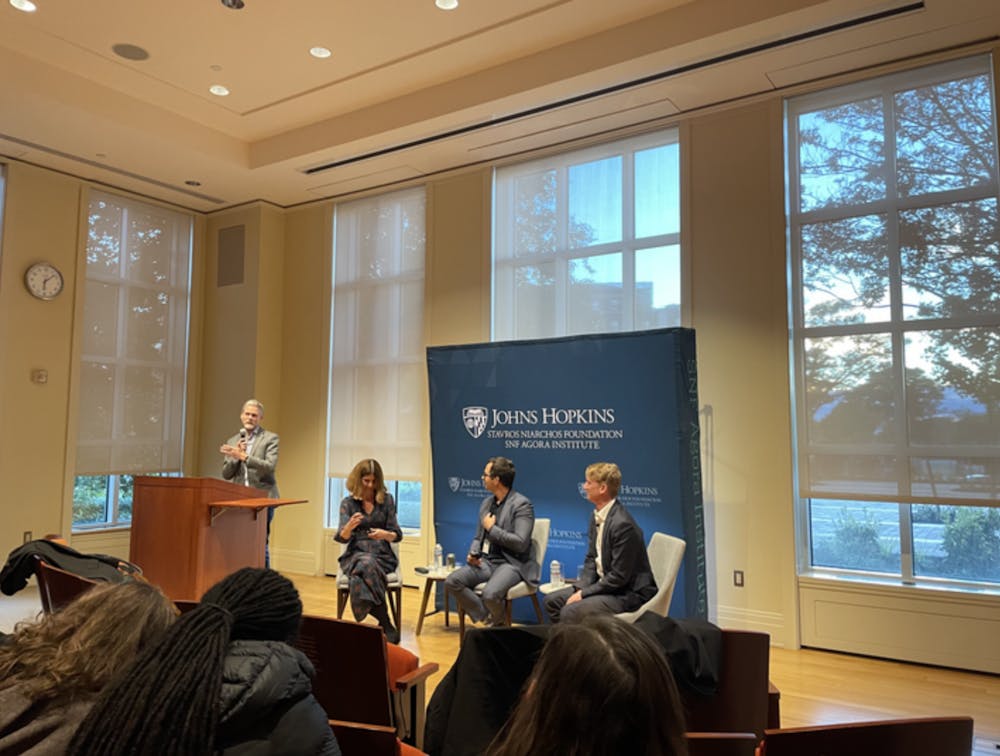The Stavros Niarchos Foundation (SNF) Agora Institute hosted co-authors Jay Van Bavel and Dominic Packer on Oct. 21 to discuss their latest book, The Power of Us: Harnessing Our Shared Identities to Improve Performance, Increase Cooperation, and Promote Social Harmony.
Van Bavel is a professor of Psychology and Neuroscience at New York University and Packer is a professor of Psychology at Lehigh University. Their book explores the role of social identity in shaping social norms, identity politics, democracy and issues of inequality.
Alison Taylor, an adjunct professor at the New York University Stern School of Business, moderated the talk.
While identity is a widely-used term, the speakers examined how misconceptions surrounding it exacerbate modern conflicts.
The first misconception Packer addressed is that groups inherently create discriminatory behavior. He explained the counterargument that norms imposed by these groups dictate how members act toward others.
“When you identify with a group, it makes you conform to the norms of that group and those norms are very often discriminatory norms or broken norms,” he said. “But they don't have to be; it's not an inevitability.”
According to Packer, existing norms can be used to incite positive change. For example, students on college campuses overestimate the extent to which other students binge drink. Since binge drinking is less common than students initially think, their binge drinking behavior is then reduced.
Packer acknowledged that norms can be harmful, in which case leaders must have a more intentional approach to how they depict the norms within their group.
“What leaders often don't pay enough attention to is that they're not just managing individuals, they're also managing groups,“ he said. “That's where I think we make the case that we need to be thinking more carefully about well, what is the identity of this group and what do we want that identity to be?”
Van Bavel pointed to the individualistic approach of self-help books as one cause of the misconceptions surrounding identity. He emphasized that changing one’s own behavior is difficult because of how strongly social environments impact identity.
Van Bavel noted that the media also makes up part of this social atmosphere. By giving attention to harmful behaviors, the media depicts actors who are partaking in bad behavior as the norm. In reality, these actors are outliers who influence rather than represent a norm. He named attitudes towards vaccines and masks throughout the pandemic as an example.
“How do we change the conversation from thinking about ‘a few bad apples’ to think about how we change the norms of our groups?” he said. “What all the research says is, the moment you change the norms, this new behavior can change in a pro-social direction and it also becomes really easy. If the norms are there, and it's part of the identity of the group you care about, it becomes second nature to you.”
In the discussion of political polarization, moderator Alison Taylor moved the conversation towards the rise in identity politics worldwide.
Van Bavel explained that the saliency of one’s identity is a natural process that can also be applied to politics. In exploring the issue, he emphasized a need for channels that allow groups to peacefully push for their interests.
“For minority groups, especially if there's a history of oppression or injustice, their identity is salient to them, that's not going to go away unless you get rid of the conditions of that oppression. Then they're going to need to mobilize politically,” he said. “Identity politics to me is something that's normal. It's often healthy. It's often a consequence of the society we create.”
He highlighted how COVID-19 has created an opportunity to change pre-existing norms. He stated that the return to in-person modalities and resuming previously paused activities may facilitate new norms in work environments, college campuses and politics.
Junior Emma Petite described how the talk gave her a new perspective on identity politics in an interview with The News-Letter.
“We've been talking a lot about identity politics and how that's shaping a lot of the violence we see in the U.S. today, especially from right-wing extremist groups,” she said. “I thought this would be an interesting way to understand that from a new angle.”
In an interview with The News-Letter, Deputy Director of the SNF Agora Institute Stephen Ruckman asserted the importance of exploring identity, especially in light of the social changes associated with the pandemic. He emphasized the SNF Agora Institute’s goal of creating spaces for the transfer of knowledge between scholars and students.
“Students at Hopkins are coming onto campus at a time in which they've been deprived of having community experiences,“ he said. “It's important for us to try to nurture conversations about how we relate to one another.”





